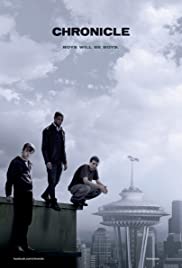Claude Lalumière & Camille Alexa review Chronicle
 Claude Lalumière: At first, Chronicle appears to be nothing special, yet another entry in the teen POV-cam subset of fantasy cinema, made especially popular with The Blair Witch Project and Cloverfield. The first act introduces the main characters: a nerdy boy (Andrew, played by Dane DeHaan) with an abusive, alcoholic father (played by Michael Kelly); his ordinary-Joe cousin (Matt, played by Alex Russell); and their uber-cool friend (Steve, played by Michael B. Jordan). Until the SF element kicks in at the end of the brief first act, there’s nothing really special going on. Just a ho-hum high-school angst story. But as soon as the teenagers get superpowers, the film itself gets supercharged and goes on to develop as perhaps my favourite live-action superhero film ever.
Claude Lalumière: At first, Chronicle appears to be nothing special, yet another entry in the teen POV-cam subset of fantasy cinema, made especially popular with The Blair Witch Project and Cloverfield. The first act introduces the main characters: a nerdy boy (Andrew, played by Dane DeHaan) with an abusive, alcoholic father (played by Michael Kelly); his ordinary-Joe cousin (Matt, played by Alex Russell); and their uber-cool friend (Steve, played by Michael B. Jordan). Until the SF element kicks in at the end of the brief first act, there’s nothing really special going on. Just a ho-hum high-school angst story. But as soon as the teenagers get superpowers, the film itself gets supercharged and goes on to develop as perhaps my favourite live-action superhero film ever.
Camille Alexa: One thing I really appreciated, particularly at the beginning, was the lack of over-explanation. We see the genesis of the powers, but aren’t burdened by ornate or unnecessary hows or whys. We get down and dirty almost right from the start, diving straight into the what if. What if this particular unlikely set of kids gets zapped with superpowers? What do they do with them? What effects does it have? That’s really what we want to know anyway. Reminds me a bit of the UK television series Misfits in that regard, though Chronicle certainly ends up having more gravitas.
CL: I hadn’t thought of Misfits, but you’re right. There are similarities. People on the cusp of adulthood get superpowers for reasons that are not explored because they are basically unknown to the protagonists, so we plunge directly into the meat of things, the what if. Too many stories get dragged down by backstory, by why, by how. Chronicle knows how to drop just enough hints for us to understand that there are several background stories unfolding, but the script never wallows in any of them, thus enriching and deepening its worldbuilding while never straying from its own story. We do see some of the how, but what we’re presented is mysterious and unexplained. We experience it with the same sense of disorientation and confusion as the protagonists do, making it much more powerful than any explanation ever could. It probably helps that, unlike most big-budget superhero films, this is the work of a synergistic vision between screenwriter/co-writer Max Landis and director/co-writer Josh Trank, and not the incoherent mishmash we usually get from over-redrafted, written-by-committee Hollywood fare. It does occasionally betray its ostensible POV-cam conceit, but, I think, to its credit. The cam thing here is a tool, not the crutch it can too easily become.
CA: I walked into this film not knowing anything about it, so the Landis name in the credits was a surprise. It turns out screenwriter Max Landis is the son of famous director/screenwriter/producer John Landis. Makes me think back, look for similarities or influences from the John Landis films I remember seeing as a kid: Trading Places, An American Werewolf in London, The Blues Brothers — all of which, I might mention, came out before Max Landis was born. But he did sell his first screenplay at the age of 18, the Masters of Horror TV episode “Deer Woman”, co-written with his dad. He later wrote solo for the series’ second incarnation, Fear Itself, with the episode “Something with Bite.” I also can’t help seeking similarities to the most recent John Landis-produced project I saw (and liked!): Some Guy Who Kills People. It might not be fair to keep linking the two filmmakers, though; Max is clearly a talent in his own right.
CL: There’s no question that, although Trank’s direction is tight, it’s the script that makes this project succeed. The second act — the trio exploring the extent and limits of their powers — is superb. Unlike the by-rote and entirely skippable training sequences of recent superhero films like Green Lantern, Captain America: The First Avenger, and X-Men: First Class, here there’s a definite sense of wonder as the three boys stretch the muscles of their new powers. The journey of discovery is the story: advancing the plot, deepening the characters, and setting up the dynamics that play into the high-stakes drama of the final act. (Comics readers might notice an homage to the apocalyptic conclusion of Alan Moore’s Miracleman in the climactic fight scene, just as the complex relationship between Matt and Andrew recalls the tragic dynamic between Miracleman and Kid Miracleman.)
CA: I’ve been so disappointed in most of those recent superflicks. I’ve been walking out of the theatre way too often lately with a feeling of, “Really? That was the best we could do with a superhero film?” I definitely did not have that feeling after Chronicle. I felt fulfilled, like I’d seen the journey I needed to see from those characters, satisfied with the deviations from formula where they occurred while still perfectly amenable to the adherences to trope.
CL: And the script does follow a classic path: this is an origin story. The story of an ordinary person finding the hero within when the world most needs a hero. The powers are secondary. It’s not the most powerful of them who becomes the hero; in many ways, it’s the least likely of them. His hero’s journey is not unlike that of some of the most iconic and lasting comics superheroes: on the one hand there’s the urgency of the plights of Peter Parker (Spider-Man), Steve Rogers (Captain America), and Bruce Wayne (Batman), but there’s also the unquestioning, steadfast will to do the right thing, without the motivation of personal tragedy, of Clark Kent (Superman), Hal Jordan (Green Lantern), and Barry Allen (Flash).
CA: But it’s also the story of a villain, a less than extraordinary person finding — and eventually embracing — the villain within. Watching Chronicle, you know the exact moment he turns the corner, feel it straight in your gut. And I love that we get to see multiple journeys, multiple paths all linked together, and yet all so inevitable. Hard not to feel satisfied when that synchronicity occurs between your experience of a film and that film’s resolution, when the ending arrives and you have to say, “Yes. Yes, that’s exactly how it needed to be.”









Pingback:In which I co-review CHRONICLE at Locus | Camille Alexa
” . . . the lack of over-explanation. We see the genesis of the powers, but aren’t burdened by ornate or unnecessary hows or whys . . . ”
So the super powers aren’t explained? So then it’s fantasy, not SF. Thanks for the warning. I’ll give it a miss (I like things explained and for it to be at least a little bit plausible)